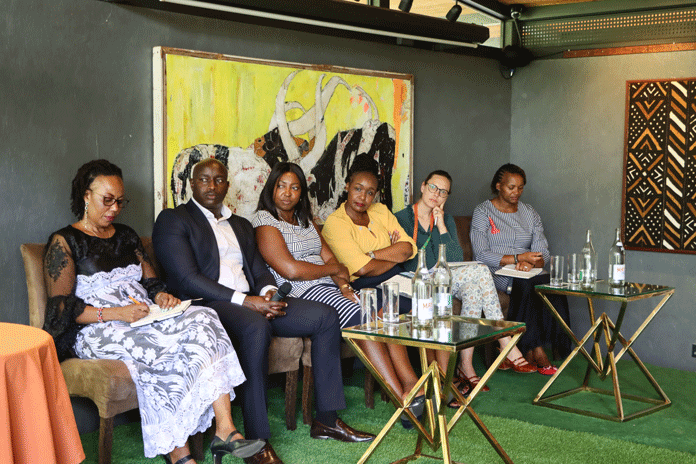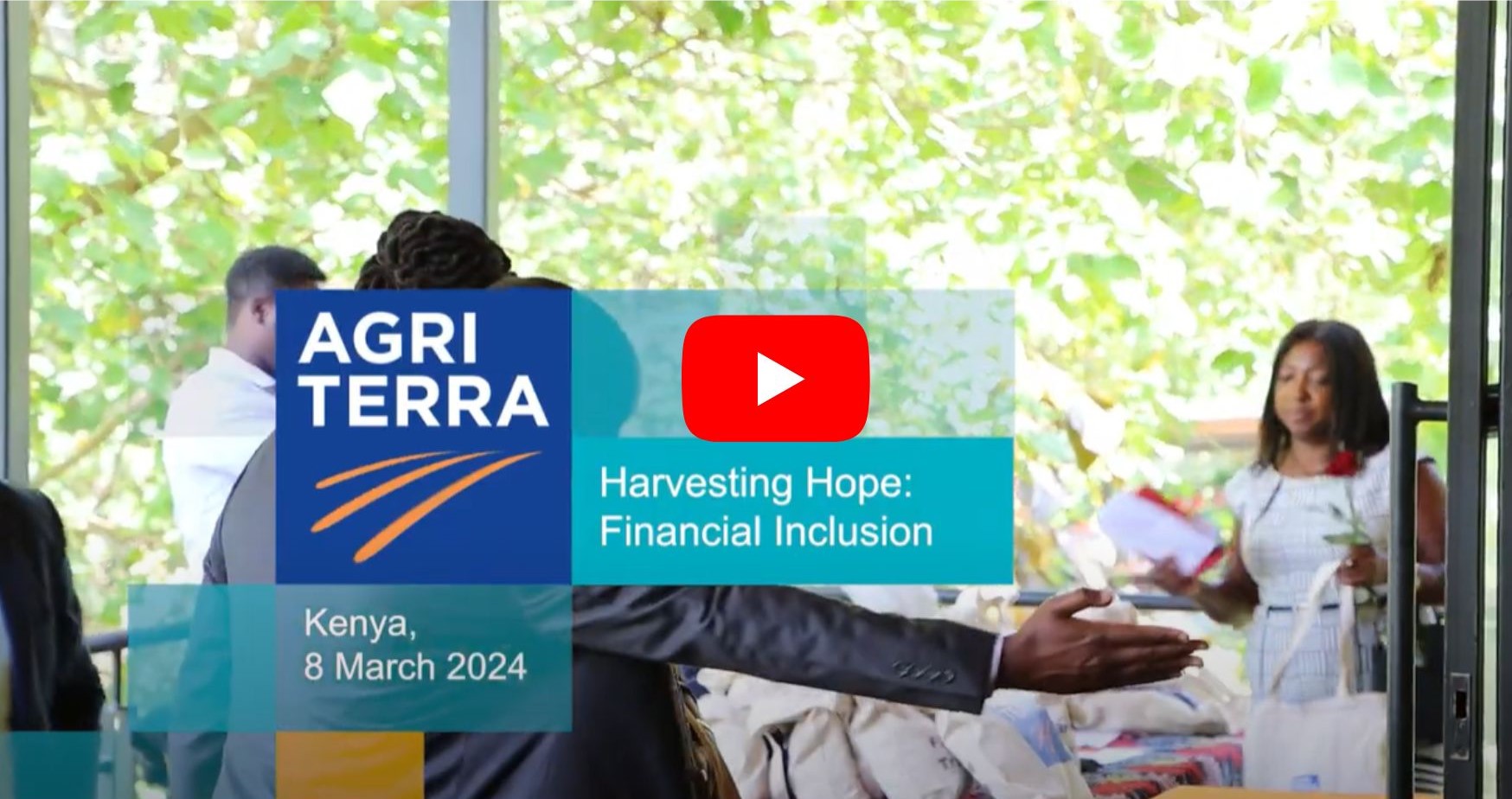Harvesting hope: financial inclusion
02-04-2024Written by Esmee van Schuppen, Programme Officer Farmer Focused Transformation & Acting Now
Despite many efforts, agricultural cooperatives in Kenya encounter challenges in attracting the necessary financing. To mark the closure of the FFT Bi-Annual meeting in Nairobi, Kenya that coincided with International Women’s Day, March 8th, 2024, Agriterra hosted an insightful panel discussion on ‘Harvesting Hope: Financial Inclusion’. Taking a gendered lens, the panel discussion, consisting of five female leaders in their respective sectors and Wilfred Chepkwony, FFT project lead Kenya unraveled the complexities and viable solutions for agricultural cooperatives to attract necessary finance, especially for female farmers. The session was skillfully moderated by Dr. Daniel Mwendah M’lutha, CEO of the Kenya National Farmers’ Federation (KENAFF) and opened by Stijn van Geel, Regional Manager East Africa at Agriterra and Marco Schouten, CEO, Agriterra.
Barriers to access finance
Financial institutions tend to consider the act of lending to farmer cooperatives, particularly in rural settings, as more perilous due to several factors including restricted collateral and unpredictable income fluctuations related to seasonal activities. Additionally, as stressed by the CEO of Commodities Fund Kenya, Mrs. Nancy Cheruiyot and Caroline Kamau Mulwa, Regional Director Africa at Oiko Credit, challenges such as financial mismanagement and lacking record keeping at cooperative persist. This often makes it challenging for cooperatives to access loans from financial institutions. This perception hits women farmers the hardest.

Insightful discussions on financial inclusion by our esteemed panellists.
From left to right: Mrs. Nancy Cheruiyot - Managing Trustee & CEO of Commodities Fund Kenya, CPA Wilfred Chepkwony - Senior Cooperative Advisor & Project Lead FFT at Agriterra, Caroline Kamau Mulwa – Regional Director Africa at Oiko Credit, Daisy Bii – Presidential Advisor on Cooperatives and Governance at the Executive Office of the President, Marieke Holscher – Head of Economic Department at the Embassy of the Kingdom of the Netherlands, and Laureen Njuguna – General manager at Starlight Farmers’ Cooperative.
Opportunities for cooperative to enhance access to finance
Mitigating this predisposition requires implementing strategies such as risk-sharing mechanisms alongside specialised support to increase the capacity of cooperatives.
According to Caroline Kamau Mulwa, Regional Director of OikoCredit in Africa, there is power in partherships. Opportunities to promote financial inclusion can be found in close collaboration with organisations that strengthen the financial management of cooperatives, like Agriterra. As such, OikoCredit can derisk the loans and credits it provides.
The Commodities Fund discussed their efforts to serve the most vulnerable groups in society by making them bankable by providing subsidized interest rates between 3% and 10%. This allows them to serve groups at the bottom of the pyramid. Additionally, specific financial education programs for cooperatives can help to build their capacity and increase their eligibility for finance, according to Mrs. Nancy Cheruiyot.
Daisy Bii, Presidential Advisor on Cooperatives and Governance at the Executive Office of the President, stressed the importance of the bottom-up economic agenda, which includes inputs from key stakeholders in all 47 counties in Kenya. This agenda is anchored on 5 pillars that can bring the largest impact on the economy, including Agricultural Transformation, MSMEs, Healthcare, Housing, and Digitalisation. Cooperatives are one of the stakeholders at the core of this highly participatory agenda. One of the policies within this agenda with high potential to increase access to finance for farmers, especially women, is the regulation of interest rates. Specifically for women, interest rates have decreased to 8%. Furthermore, the policy focuses on creating a digital superhighway, including digital money platforms, enabling farmers to access credits digitally under favourable conditions.
Financial inclusion of women
Next to the opportunities for cooperatives to increase access to finance, the panelists also discussed how to promote financial inclusion of women.
The inadequate involvement and representation of women in the decision-making processes of agricultural cooperatives and financial institutions can impede their capacity to advocate for themselves and obtain necessary resources. As pointed out by Marieke Holscher, Head of Economic Department at the Embassy of the Kingdom of the Netherlands, we should be idealistic and go beyond promoting financial inclusion for women. To create a lasting impact, measures such as advocating for women’s rights to land ownership, access to energy, and improving access to digital tools are pivotal.
To truly overcome the hurdle women face to access finance, it is vital to encourage gender equality and elevate female leadership. As emphasized by Wilfred Chepkwony, Agriterra is keen to strengthen the position of female members and leaders in cooperatives. Through its Female Leadership Trajectory, Agriterra contributes to closing the gender gap in agricultural cooperatives by increasing the representation of women in decision-making bodies of the cooperative. To date, the FFT programme has delivered 25 Female Leadership Trainings, reaching a total of 504 participants, of which 311 women and 143 youth. Furthermore, a total of 23 women councils have been established at FOs, strengthening the decision-making power of women in cooperatives.
The General Manager of Starlight cooperative has experienced this trajectory firsthand. A women council has been established at the cooperative, which does not only capacitate women to engage in business activities of the cooperative, but also enhances access to finance for women by offering saving and lending services. Furthermore, following Agriterra’s training on internal capitalisation, Starlight Cooperative realised that starting from within is essential to mobilise capital. Through shares and member deposits, Starlight was able to invest in machinery to increase the production of potato seeds. The investments have attracted women to start engaging in the business of the cooperative.
To sum up, to increase financial inclusion for cooperatives, and particularly for women, a comprehensive approach is needed. This involves government regulations, financial organisations, non-governmental entities and other key players. Strong cooperatives and capacitated women are essential to achieve lasting impact on economic empowerment. As the moderator, Mwendah M’lutha stated: “Give a women a shilling, and she will make it grow”

